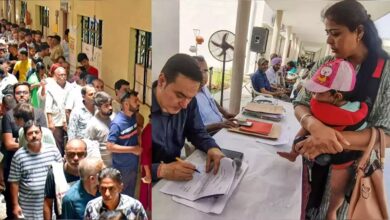Lok Sabha 2024 Phase I – Updates from 19th April

By Agnibeena Ghosh/ 20 April 2024
The inaugural phase of voting for India’s extensive Lok Sabha Elections 2024 occurred on Friday, April 19. While isolated incidents of violence and firing were reported in certain areas of West Bengal and Manipur, the Election Commission of India stated that the initial phase of polling was predominantly peaceful across 21 States/Union Territories. By 6 pm, voting had concluded in 102 Lok Sabha constituencies.
A voter turnout of approximately 60 percent was registered across the 102 Lok Sabha seats by 7 pm. Tripura boasted the highest turnout, reaching around 80 percent, closely followed by West Bengal at 77 percent. In Tamil Nadu, where all Lok Sabha constituencies underwent polling in a single phase on April 19, the southern state recorded a voter turnout of 72 percent by 7 pm.
The initial phase of elections for eight constituencies in western Uttar Pradesh took place on Friday, with a recorded voter turnout of approximately 57.54 percent by 5 pm. The voting experience for most citizens was peaceful, and according to the Uttar Pradesh police, the law and order situation remained under control across all eight constituencies. D K Thakur, additional director general of police, Meerut Division, highlighted the significant deployment of security and police personnel to ensure the smooth conduct of the voting process. He emphasized the additional measures taken, including enhanced border checks and the prevention of anti-social elements from approaching polling stations, resulting in the absence of any reported issues.
The Election Commission reported a total of around 80 candidates vying for seats across the eight Lok Sabha constituencies in this initial phase, encompassing a vast electorate of 144,01,543 voters. Of these, 76,54,658 are men, 67,46,136 are women, and 749 belong to the third gender category. The electoral infrastructure included 14,845 polling booths and 7,693 polling centers, equipped with 18,662 EVM control units, 18,734 ballot units, and 19,603 VVPATs. Nearly half of the polling stations were set up for live webcasting through Cvigil.
Tajinder Singh Bittu, having tendered his resignation from the Congress party, officially embraced the BJP at the party’s headquarters in Delhi, a ceremony graced by the presence of Union Minister Ashwini Vaishnaw and party general secretary Vinod Tawde. Bittu, who formerly held the position of AICC Secretary In-Charge for Himachal Pradesh, announced his departure from both his party role and primary membership in Congress earlier on the same day.
In a recent address at a rally in Nanded, Maharashtra, Prime Minister Modi took aim at the INDI alliance, critiquing its failure to communicate a clear collective leadership to the Indian populace. Furthermore, he highlighted a notable aspect of internal competition within the INDI alliance, with candidates from the coalition vying against each other for a significant share, approximately 25%, of the Lok Sabha seats. This internal strife within the alliance was identified as a potential threat to its overall electoral strategy and unity during the impending elections.
Shifting focus to Odisha, Union Minister Dharmendra Pradhan, also BJP’s Lok Sabha candidate from Sambalpur, engaged in an unconventional election campaign by riding a scooty and partaking in tea at a local shop in Sambalpur. This gesture served as a unique approach to connecting with constituents during his campaign efforts.
Meanwhile, during Union Home Minister Amit Shah’s visit to Bihar, former Deputy Chief Minister and RJD leader Tejashwi Yadav made a bold declaration, expressing confidence that the BJP’s endeavors would inadvertently bolster support for the RJD among voters. Yadav dismissed the significance of Shah’s political campaigns in the state, asserting that repeated visits from BJP leaders would only serve to bolster the RJD’s voter base. He derided the BJP as a “liar’s party,” highlighting their shifting alliances and dismissing any potential impact of Shah’s visits on the electoral landscape of Bihar.







